- Blog
- 11 Types of Trust Badges to Boost Ecommerce Conversion Rates
11 Types of Trust Badges to Boost Ecommerce Conversion Rates
-
Nikolett Lorincz
- Ecommerce
- 6 min read
Table of Contents
Gaining the trust of your consumers is extremely important in the online world. Why? Because 81% of online shoppers feel concerned when shopping on an ecommerce site they don’t know. This lack of trust can lead to shopping cart abandonment and impact your conversion rates.
Website trust badges are one of the best ways to build trust with your customers.
In this article, we’ll answer the questions:
- What are trust badges?
- Why are they necessary for an ecommerce business?
We’ll also cover the most common types of trust badges that can help you increase your conversion rate.
Let’s get right into it!
What is a trust badge?
A trust badge is a symbol or a small image placed on a website that aims to convince visitors that their personal data will be handled safely.
Since online purchases don’t happen in person, people can’t just judge trustworthiness by looks or gut feeling. They don’t interact with a storekeeper, which means they need some other kind of proof that they’re safe…and that’s exactly where trust badges come in.
Trust badges usually involve a connection to an external service that verifies your store’s trustworthiness. The companies that offer these kinds of services might charge a fee, but that’s a small price to pay for happy, trusting customers.
Below, you can see some examples of trust badges.

Image source: Oberlo
Why are trust badges necessary?
Trust badges do precisely what their name suggests: they help to instill trust in your visitors.
This is especially important if your ecommerce site handles payments or any kind of personal data, even if it’s just by offering a simple email subscription. GDPR didn’t only force online business owners to act more responsibly, it also made visitors more aware of their own data.
Potential ecommerce customers leave during checkout for a number of reasons, not just because they change their minds about what’s in their cart. One of the reasons they might bail before completing their purchase is if they feel unsafe handing over their payment details to an online store that they haven’t shopped at before.
Even if your own website looks credible, if the payment provider’s UI looks sketchy, you might lose sales.
And remember: even if you take all the necessary precautions to handle customer data in the safest way possible, it doesn’t matter unless you show that to your online shoppers. They need to know that they’re protected, and that’s where trust badges come in handy.
By incorporating trust badges, you instill confidence in your customers, which positively influences their decision-making process. Users are more likely to proceed with a purchase when they feel assured that their data is protected, reducing concerns about potential fraudulent activities.
Furthermore, trust badges create a sense of authenticity and credibility, which are crucial factors in building trust with online shoppers.
Ultimately, trust badges serve as powerful tools for boosting ecommerce conversions and cultivating a trusting relationship with your audience.
Where to place trust badges on your website?
A crucial location for trust badges is the payment page, where users may have initial doubts or concerns about sharing personal information. By displaying secure checkout badges here, you can instill confidence in users that their transactions and data will be handled securely.
Another significant spot to showcase trust badges is the homepage. This is where new users are likely to land when searching for your brand, making it essential to build customer trust and confidence. Include reviews, awards, or any other relevant badges on this page to showcase your credibility.
For ecommerce websites, there are multiple options for trust seal placement, with all of the above-mentioned locations being relevant.
However, the checkout page is particularly crucial as trust is tested the most when a customer is about to make a purchase.
To ensure maximum impact, make sure trust badges are easily visible during the micro-moments where trust may waver.
5 most common types of trust badges
Trust badges matter most for ecommerce sites that want to get people to enter their credit card details. But they also matter in other cases.
Let’s take a look at the most common trust badges you need!
1. SSL badges
The work of trust badges begins right after a customer opens a website.
If an ecommerce store isn’t using an SSL certificate, they’ll be greeted with a message right away that their data isn’t handled in a secure way (at least if you use Chrome):
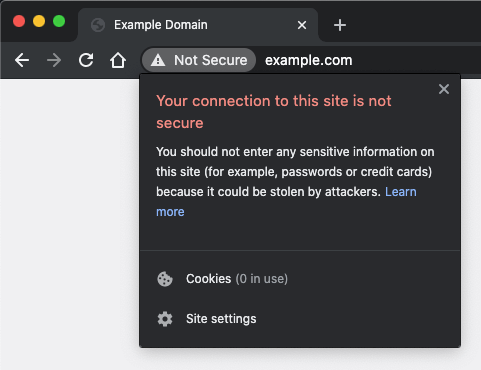
However, if you acquire even the most basic SSL certificate, that warning gets replaced by a lock icon, and if your visitor clicks on it, they’ll get more details about the SSL badge.
But only if it’s not expired… these SSL trust badges don’t (and shouldn’t) last forever, so make sure you don’t forget about them.
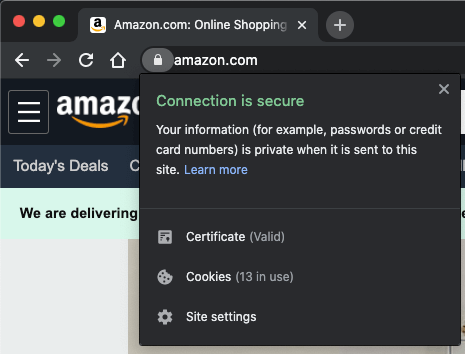
2. Accepted payment badges
Accepted payment badges are another type of trust badge that an online retailer can use, and these badges are displayed during checkout.
Payment badges aren’t too distracting (usually). They’re just noticeable enough to ensure a visitor that’s about to pay will see them. They indicate a safe, secure checkout process.
Credit (or debit) card logos also belong to the payment trust badges category. If you display the accepted payment options in your online store, people don’t need to stop and think about whether their cards will be accepted or waste time searching for your accepted payment methods.
Of course, anyone can show these logos on their website, so it’s crucial that you only display logos of cards (or other payment badges) that you actually accept.
Here’s an example from asos.com displaying accepted payment trust badges in the cart:
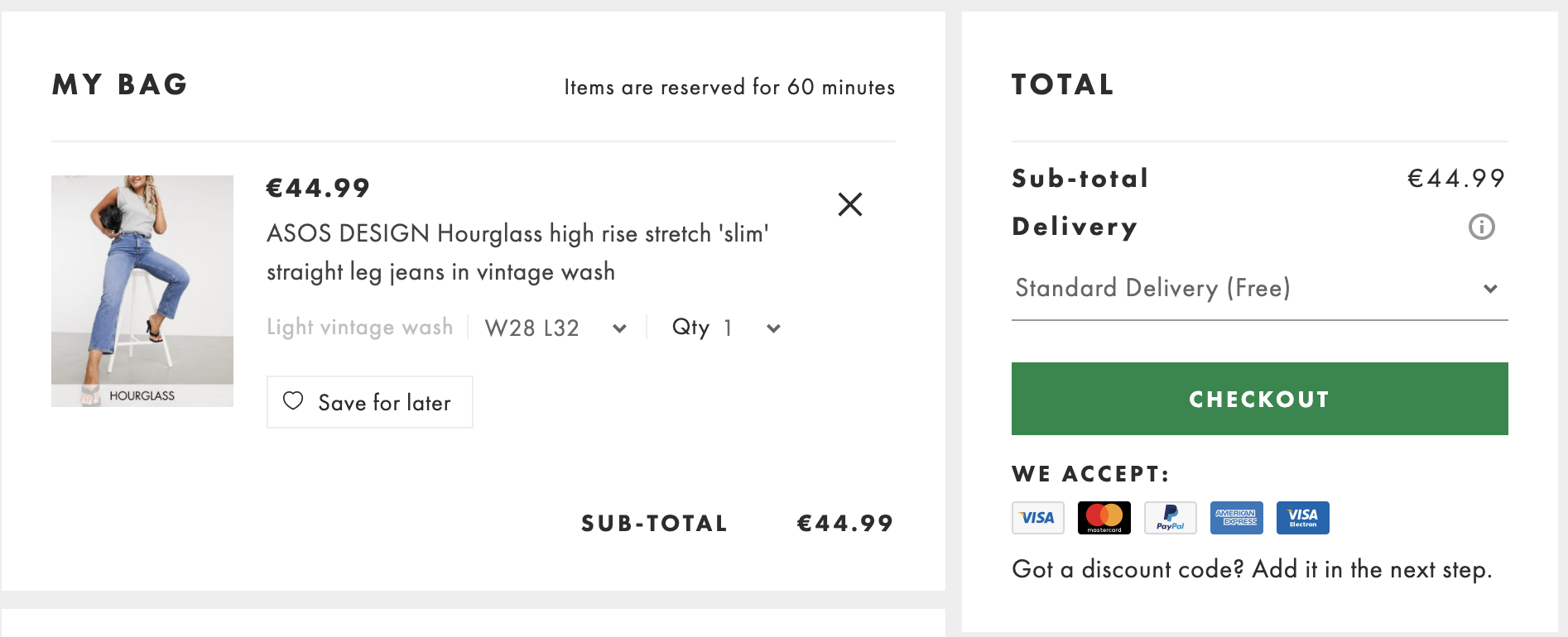
3. Awards
If your online store has won any kind of award, don’t be afraid to show it! Customers will appreciate it, and they’ll automatically trust you more.
If you can back it up with a link that leads to more details about the award, you can add even more credibility.
Check out how OptiMonk highlights its awards and third-party endorsements in the footer:

4. Money-back guarantee badges
If you haven’t yet implemented a money-back guarantee policy for unsatisfied customers, you should definitely consider adding one. Then show it on your website with a money-back guarantee badge.
In most cases, the number of happy customers will exceed those who end up claiming the money-back guarantee offer by a considerable margin.
Here’s an example from BOOM By Cindy Joseph. They highlight their money-back guarantee badge on product pages.
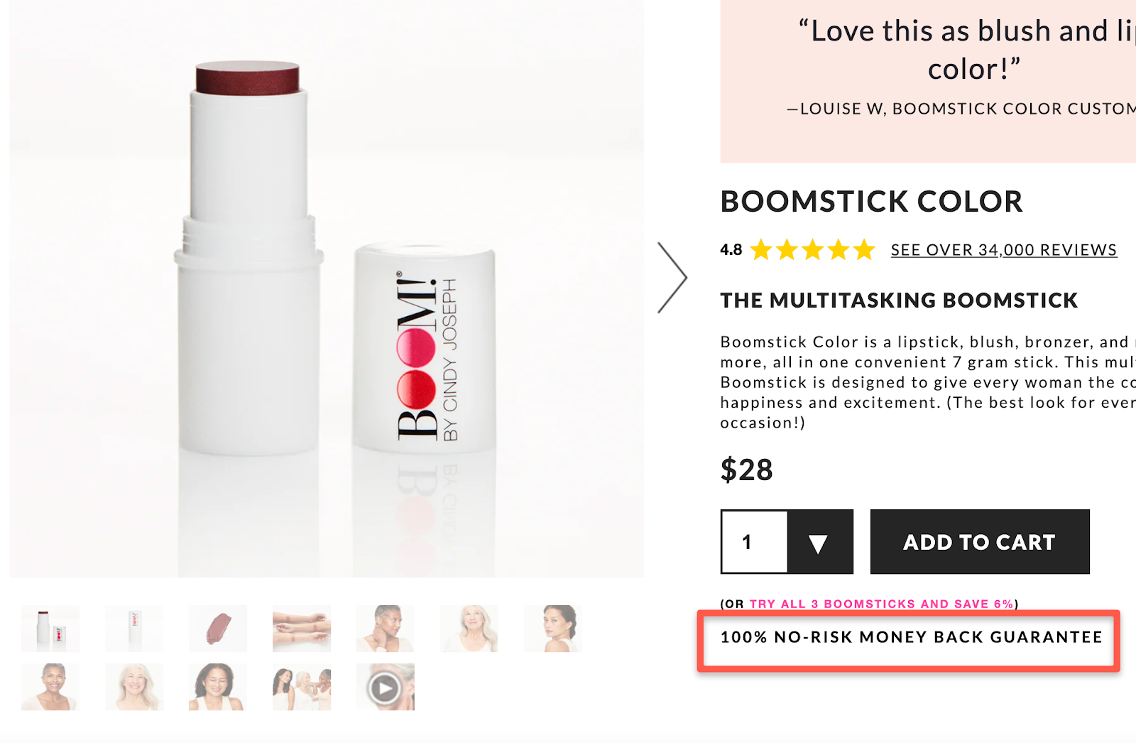
Free trials also fall into this category of trust badges. If a visitor still hasn’t made up their mind to sign up for your service, a free trial might just make all the difference.
5. Free shipping badges
A free shipping badge tells your customers that you offer free shipping. For many customers, this is a must-have, and it also helps to build trust and credibility.
You can place free shipping trust badges basically anywhere on your website, but it’s worth highlighting on your checkout page, too.
Urban Outfitters uses a sticky bar on the checkout page as a free shipping trust badge:
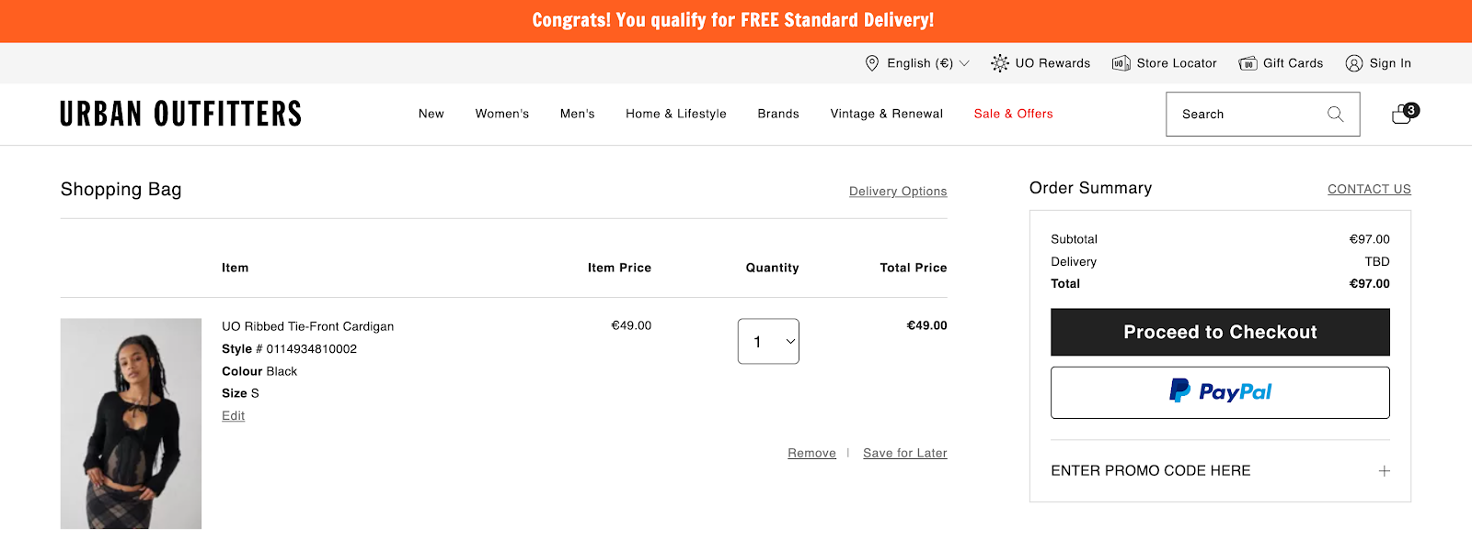
6 other badges to consider
While the five most common types of trust badges are widely recognized and effective, there are more trust badges worth considering for ecommerce sites.
Let’s take a look at them!
- A secure checkout badge (or safe checkout badge) assures customers that their personal and financial information is safe during the transaction process. It indicates that your website utilizes encryption and other security measures to protect sensitive data from unauthorized access.
- You can also integrate PayPal badges into your website to improve trust as PayPal is a well-established and trusted payment platform worldwide.
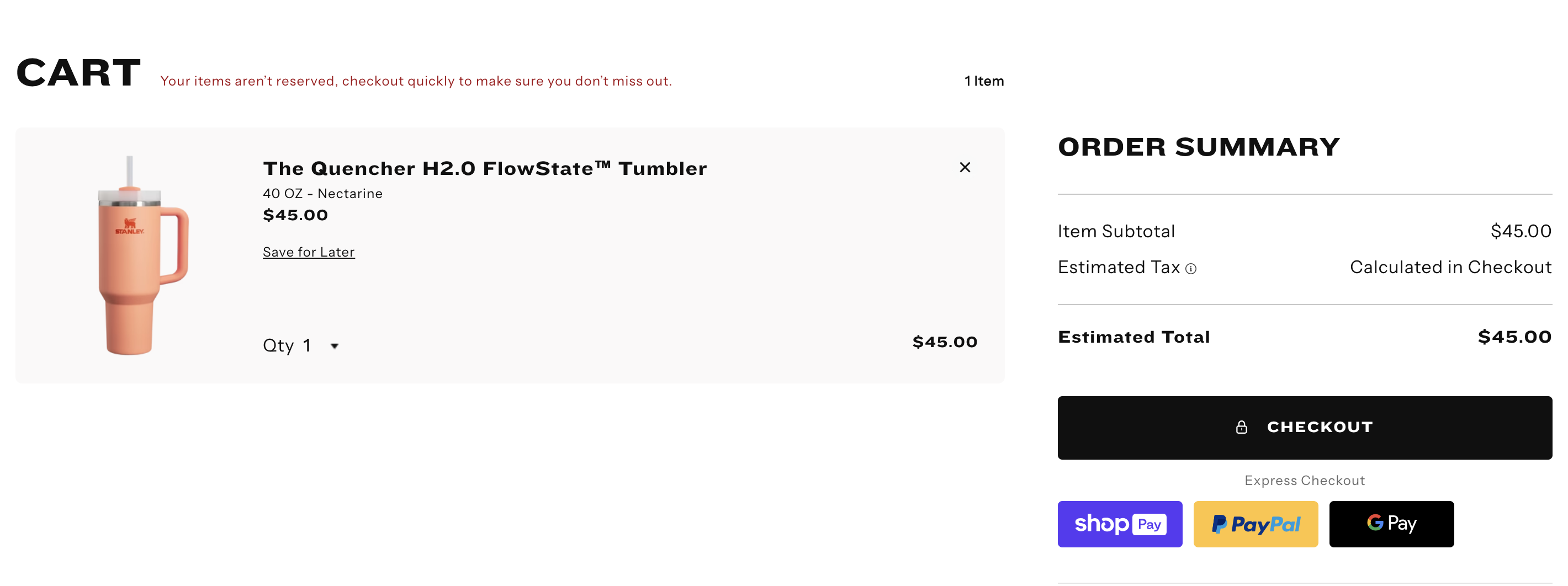
- A third-party endorsement badge signifies that your business has been recognized or certified by reputable organizations or industry authorities. This could include certifications from any third-party company such as security firms, industry associations, or quality assurance agencies.
- Offering a best-price guarantee badge communicates to customers that they’re getting the most competitive prices available. This trust badge assures them that if they find the same product elsewhere at a lower price, you’ll match or beat it.
- Review and social media trust badges are powerful tools for showcasing your company’s social proof and customer satisfaction. These badges can be obtained from well-known review platforms such as Yelp, Google Reviews, or Trustpilot. By displaying these badges on your homepage, product pages, or checkout page, you provide potential customers with visible proof of your positive reputation.
- Customer logo trust badges are another effective way to build trust and credibility. These badges feature the logos of well-known companies that have used your products or services. By displaying these logos on your homepage, product pages, or checkout page, you show potential customers that reputable businesses trust you.
How to choose the right trust badges for your online store?
Choosing the right trust badges for your online store is crucial for addressing your customers’ concerns and enhancing their shopping experience.
Here’s a step-by-step guide to help you make the best choices:
- Identify your customer’s concerns: Start by understanding what worries your customers the most. Are they concerned about security, payment methods, or product quality? Knowing their pain points will help you select the most relevant trust badges.
- Select relevant trust badges: Choose trust badges that directly address your customers’ concerns. For instance, if security is a major issue, SSL trust badges are essential. If product quality is a concern, money-back guarantee badges can be very reassuring.
- Prioritize relevance: Ensure that the trust badges you choose are pertinent to your industry and resonate with your target audience. For example, a tech-savvy audience might look for different badges compared to a general consumer audience.
- Ensure authenticity: Only use genuine and recognized trust badges. Authenticity is key to building trust, so make sure the badges you display are from reputable sources.
- Display strategically: Place your trust badges where they will have the most impact, such as on the homepage, product pages, or checkout page. Strategic placement ensures that customers see these badges at critical points in their shopping journey.
How can you set up your own trust badges?
Displaying your badges depends on what kind of trust badges you want to use. Awards or free trial offers are super easy: you just need to create an appealing image (if you don’t have one yet) and show it to visitors where it matters most.
If your website is built on a custom CMS, you need to figure out how to connect it to external services that offer reliable trust verifications.
But if you’re using Shopify or WordPress, you’re in luck! Getting your first trust badge can be as easy as installing a plugin.
Here’s the tutorial for installing Shopify’s own website security trust badge.
Free trust badges
To build customer trust, there are a number of free trust badges you can use. Here are a few of the best:
- AVA Trust Badges: A Shopify app offering customizable trust badges to highlight secure payments.
- Trust Me – Trust Badges & Icon: This app allows for easy badge integration and customization.
- Ultimate Trust Badges: Another free trust badge tool with pre-designed badges like SSL secure or satisfaction guarantees.
Finding your favorite trust badge is just as easy for a WordPress site. Here’s a link to help you explore your choices.
Wrapping up
Trust badges are a powerful tool to make your website more trustworthy. They’re definitely worth using in your ecommerce store to gain users’ trust and help potential customers overcome their doubts about buying online.
Trust badges can help improve your conversion rate and increase sales. But even more importantly, trust badges help establish your store as a credible, trustworthy place to shop—and that’s priceless.
Migration has never been easier
We made switching a no-brainer with our free, white-glove onboarding service so you can get started in the blink of an eye.
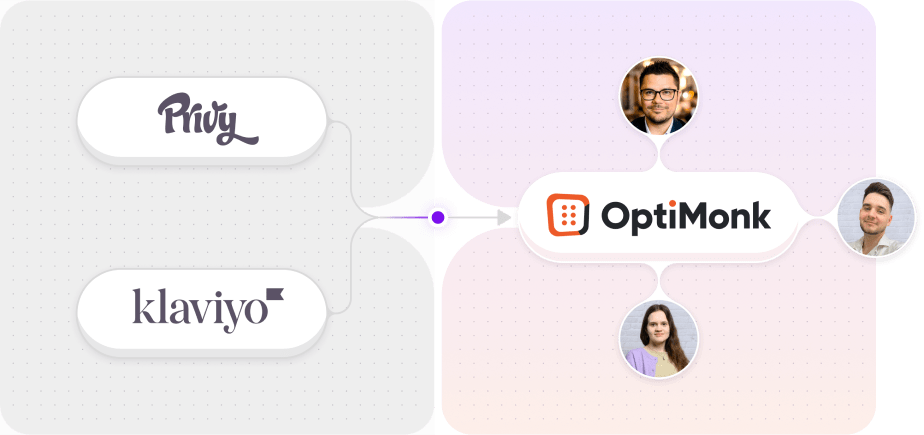
What should you do next?
Thanks for reading till the end. Here are 4 ways we can help you grow your business:
Boost conversions with proven use cases
Explore our Use Case Library, filled with actionable personalization examples and step-by-step guides to unlock your website's full potential. Check out Use Case Library
Create a free OptiMonk account
Create a free OptiMonk account and easily get started with popups and conversion rate optimization. Get OptiMonk free
Get advice from a CRO expert
Schedule a personalized discovery call with one of our experts to explore how OptiMonk can help you grow your business. Book a demo
Join our weekly newsletter
Real CRO insights & marketing tips. No fluff. Straight to your inbox. Subscribe now
Nikolett Lorincz
- Posted in
- Ecommerce
Partner with us
- © OptiMonk. All rights reserved!
- Terms of Use
- Privacy Policy
- Cookie Policy
Product updates: January Release 2025








